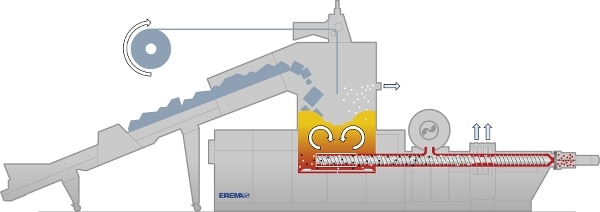The washing line at the Poligroup site transforms agricultural films and films from supermarkets into recycled material that will then be used for the production of bin liners, protective sheets and construction foils. It is not necessary to add new plastic material; the three new products are made up of 100% recycled plastic material from the Herbold film washing line.
Many basic conditions for the economic operation of a washing plant for plastics waste are set by the market such as the costs for the procurement and the transport of the input material or the attainable prices for the finished product. With an optimal machine configuration, the operator will be able to process a bad-quality input material or to obtain a high-quality end product. It is also extremely important to have well-trained personnel for the operation of the plant. It has also been proven several times that Germany can also be an economic location for the operation of such a plant.
The overall cost effectiveness of a washing line for the recycling of film is determined by the recycling costs. The greatest part of them is the energy cost. An economic, efficient plant design can reduce this part of the costs.
The power demand of the film recycling plant installed for Poligroup is some 0.8 to 1.0 MW per tonne produced end product which corresponds to 0.8 to 1.0 kW per kilo end product.
In the whole system, there is a high amount of circulation water that is continuously reused. As little as 1 to 2 m³ of fresh water per tonne input material are needed for the regeneration of the circulation water.
In order to guarantee a long-lasting operation of such a plant, issues such as maintenance and servicing have to be considered as early as the first design steps. Without a good and precautionary maintenance, the treatment of abrasive materials such as sand will not be possible. The greatest attention has to be paid to wear-prone areas, they will have to be protected. Therefore, these wear zones are equipped with exchangeable anti-wear plates.
The decisive argument for the purchase of the Herbold Meckesheim washing plant, for Poligroup obviously has been the high variability of the plant. This pant can cope with highly contaminated film as well as with extremely thin-walled film. The prewashing unit and hydro-cyclone separation step that are part of the washing line are the outstanding construction features of the plant.
The plant according to its design provides washed homogeneous high-quality film flakes that are ideal for further treatment in an Erema extrusion system.
With Poligroup, downstream of the Herbold washing line, the washed and recycled film flakes are then treated with the reliable plastics recycling technology from Erema. The Poligroup plant system consists of a Erema TVEplus (throughput: 1,100 – 1,200 kg/h) with laser filter LF2/350 (fineness of filtration: 110 µm and the die-face granulating system HG 244.




